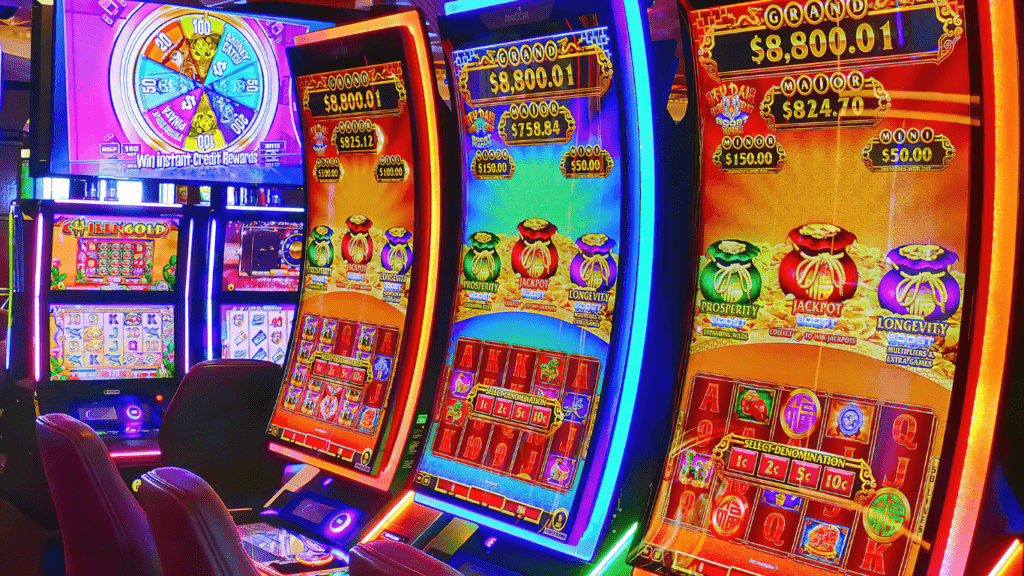Slot machines have always carried an air of mystery and excitement, drawing in players with their flashing lights and spinning reels. But let’s be honest—there’s no shortage of myths and “foolproof” strategies floating around about how to beat the slots. From timing your spins to chasing “hot” machines, these tales can make anyone wonder what’s fact and what’s pure fiction.
Understanding Slot Machines
Slot machines operate on complex systems while appearing simple to play. Understanding their mechanisms helps dispel myths surrounding their functionality.
The Basics Of How Slot Machines Work
- Slot machines rely on software and mechanical components to determine outcomes.
- Each game consists of spinning reels, paylines, and an assortment of symbols.
- Players initiate a spin by pressing a button or pulling a lever, setting the reels in motion. Symbols align on predefined paylines to award prizes based on combinations.
- Payouts are determined by the machine’s paytable, detailing potential prizes for each symbol combination.
- Higher-paying symbols occur less frequently than lower-paying ones, contributing to the game’s expected return-to-player (RTP) percentage.
- RTP, usually displayed as a percentage like 95%, represents the average amount returned to players over countless spins, not individual gameplay.
RNG (Random Number Generator) Explained
The random number generator (RNG) is the heart of every modern slot machine. RNG algorithms generate thousands of numbers per second to ensure outcomes are unbiased and unpredictable. Each number corresponds to specific reel positions, dictating the result of each spin.
RNGs make it impossible to manipulate results, guaranteeing fair and random outcomes. Even when not in use, the machine continues generating random numbers, meaning no two spins are influenced by previous outcomes. Regulators regularly test RNG software to ensure compliance with industry standards and maintain fair play for all users.
Top Slot Machine Myths Debunked
Many players believe slots operate on strategies or predictable cycles. I’ll debunk the most common myths about slot machines to separate fact from fiction.
Myth 1: Slot Machines Are Due For A Win
The idea that a machine will “hit” after a losing streak is false. Modern slots use a Random Number Generator (RNG), which creates completely independent outcomes for each spin. Whether a machine hasn’t paid out in hours or just hit a large jackpot, the next spin remains entirely random. RNG technology ensures every result is unpredictable.
Myth 2: Casinos Control Slot Payouts Remotely
Casinos don’t manipulate individual slot results. Slot payout percentages, known as RTP, are programmed into the machine’s software by the manufacturer. Regulatory bodies strictly test and approve both the software and machine before it’s deployed. Any alteration to the payout programming would require physical access and proper authorization, making remote manipulation impossible.
Myth 3: Betting More Increases Your Chances Of Winning
While betting maximum amounts may unlock additional features like higher jackpot eligibility, it doesn’t improve a machine’s odds of spinning a winning combination. Payouts and probabilities remain fixed by the game’s design, regardless of the bet size. Playing within your budget is the best course of action.
Myth 4: Specific Times Of Day Yield More Winnings
Slot machines operate continuously with no adjustment based on the time. RNG systems guarantee that the time of day, day of the week, or peak casino hours don’t influence outcomes. Any perceived patterns are due to random streaks, not actual timing advantages.
What Really Influences Slot Machine Results

Slot machine results rely on unbiased mathematical systems, not myths or tricks. Knowing the factors that drive outcomes helps clarify misconceptions and improves understanding.
Role Of Luck Versus Strategy
Luck governs every slot spin, as outcomes depend on the random number generator (RNG). This software ensures every result is entirely independent, meaning previous wins or losses don’t affect future spins. Strategy, like managing a budget or choosing games with higher RTP percentages, impacts how long you play but doesn’t alter the randomness of outcomes.
How Payout Percentages Work
- Payout percentages, or return-to-player (RTP) rates, represent the average portion of total wagers a slot returns to players over time.
- A slot with an RTP of 96% retains 4% of all bets long-term.
- Manufacturers set these percentages during production, and regulators ensure compliance, so casinos cannot modify these rates once installed.
- Higher RTP slots statistically provide better returns over extended periods, though short-term results vary widely due to randomness.
Importance Of Choosing The Right Slot Machine
Selecting the right machine enhances entertainment and potential odds. Games with higher RTP rates, low to medium volatility, and well-understood rules suit most casual players. Volatility measures a slot’s risk; high-volatility slots deliver fewer but larger payouts, while low-volatility slots offer frequent, smaller rewards. Match a slot’s features to personal preferences to maximize enjoyment without chasing unrealistic expectations.
Tips For Maximizing Your Experience
Enhancing your time on slot machines requires a mix of smart planning and realistic expectations. While luck drives the outcomes, certain approaches can help make playing more enjoyable and rewarding.
Managing Your Bankroll Effectively
Planning your bankroll ensures longer playing sessions without financial stress. I divide my budget into smaller portions and set limits for each session, avoiding overspending. For instance, if I have $200, splitting it into four $50 sessions helps me stay disciplined. I always stop playing when I reach my daily limit. Additionally, I avoid chasing losses, knowing that all spins are random and past outcomes don’t dictate future possibilities.
Understanding Volatility And Variance
Recognizing slot volatility informs my game selection strategy. I choose high-volatility slots for fewer but potentially larger wins and low-volatility slots for frequent smaller payouts, depending on my preferred risk level. For example, high-volatility games may suit me if I aim for jackpot-style excitement, while low-volatility games are ideal for extending playtime with steady rewards. Variance explains the range of outcomes over time, and I remind myself that short-term results don’t always reflect a game’s RTP.
Playing For Entertainment, Not Just To Win
Treating slots as entertainment prevents unrealistic expectations. I select games with themes, graphics, or features I enjoy, like movie-inspired slots or free spin bonuses. By focusing on fun rather than profits, I maintain a positive outlook during both winning and losing streaks. Knowing my payment doesn’t guarantee winnings keeps me engaged for the experience itself rather than potential financial gain.




